May Vietnamese upper secondary school students with GPA below 3.5 advance to the next grade?
May Vietnamese upper secondary school students with GPA below 3.5 advance to the next grade?
Clause 2, Article 9 of Circular 22/2021/TT-BGDDT provides for the assessment of students' academic results as follows:
Assessment of students' academic results
...
- Academic results for each semester and the whole school year
...
c) Pass level:
- Having at most 01 (one) subject assessed by comments rated as Not achieved.
- Having at least 06 (six) subjects assessed by comments combined with score assessment with a semester average score (ĐTBmhk) and end-of-year average score (ĐTBmcn) of 5.0 or higher; no subject with a semester or end-of-year average score below 3.5.
d) Not achieved level: Other cases.
...
Based on Article 12 of Circular 22/2021/TT-BGDDT regarding promotion, reassessment during the summer break, and non-promotion, as follows:
Promotion, reassessment during the summer break, non-promotion
- Students who meet all the following conditions are promoted or acknowledged as having completed the secondary school program or upper secondary school program:
a) Annual behavior result (including reassessment results after training during the summer break as prescribed in Article 13 of this Circular) rated as Pass level or higher.
b) Annual academic result (including reassessment results of subjects as prescribed in Article 14 of this Circular) rated as Pass level or higher.
c) No more than 45 days absent from school in a school year (calculated according to the plan of 1 session/day specified in the General Education Program, including both excused and unexcused absences, continuous or non-continuous absences).
- Students required to train during the summer break follow the provisions of Article 13 of this Circular; students required to retake assessments of subjects follow the provisions of Article 14 of this Circular.
3. Students who do not meet the requirements stipulated in Clause 1 of this Article are not promoted or acknowledged as having completed the secondary school program or upper secondary school program.
- For students with disabilities: The principal bases their decision on the assessment results of students with disabilities as prescribed in Article 11 of this Circular to decide on promotion or acknowledgment of completion of the secondary school program or upper secondary school program for students with disabilities.
Based on Article 14 of Circular 22/2021/TT-BGDDT regarding retaking assessments during the summer break as follows:
Retaking assessments of subjects during the summer break
For students who do not qualify for promotion but have an annual behavior result rated as Pass level or higher, and an annual academic result rated as Not achieved, they can retake assessments of subjects rated as Not achieved (for subjects assessed by comments) and subjects with a year-end average score below 5.0 (for subjects assessed by comments combined with score assessment). The reassessment result of any subject is used to replace the annual academic result for that subject to consider promotion as specified in Article 12 of this Circular.
Thus, students with GPA below 3.5 will have their academic results rated as Not achieved. Therefore, students with GPA below 3.5 must reassess their results in subjects that are rated as Not achieved or have a year-end average score below 5.0.
If upper secondary school students' reassessment results are achieved, they will be promoted. If upper secondary school students' reassessment results are not achieved, they will not be promoted.
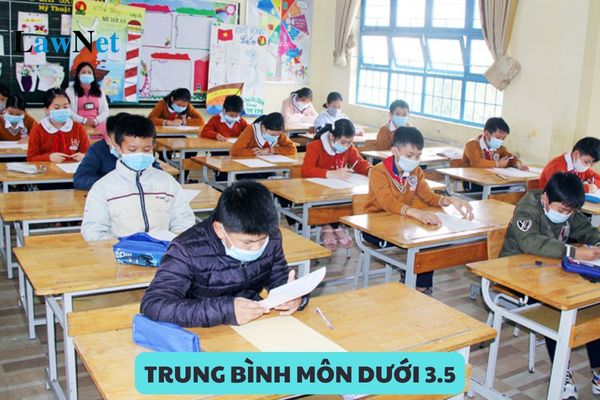
May Vietnamese upper secondary school students with GPA below 3.5 advance to the next grade? (Image from the Internet)
How many levels of assessment of training results are there for upper secondary school students in Vietnam in each semester?
Based on Article 8 of Circular 22/2021/TT-BGDDT regarding the assessment of training results as follows:
Assessment of training results
...
- Students' behavior in each semester and the whole school year
Students' behavior in each semester and the whole school year is assessed according to 01 (one) of 04 (four) levels: Excellent, Good, Pass, Not achieved.
a) Students' behavior in each semester
- Excellent level: Meeting the requirements regarding qualities specified in the General Education Program and having outstanding achievements.
- Good level: Meeting the requirements regarding qualities specified in the General Education Program and having some outstanding achievements but not reaching the Excellent level.
- Pass level: Meeting the requirements regarding qualities specified in the General Education Program.
- Not achieved level: Failing to meet the requirements regarding qualities specified in the General Education Program.
Thus, there are 4 levels of behavior assessment for upper secondary school students in each semester as follows:
- Excellent level: If the student meets the requirements regarding qualities specified in the General Education Program and has many outstanding achievements.
- Good level: If the student meets the requirements regarding qualities specified in the General Education Program and has some outstanding achievements but does not reach the Excellent level.
- Pass level: If the student meets the requirements regarding qualities specified in the General Education Program.
- Not achieved level: If the student fails to meet the requirements regarding qualities specified in the General Education Program.
What are the forms for periodic assessment of upper secondary school students in Vietnam?
Article 7 of Circular 22/2021/TT-BGDDT provides for periodic assessment as follows:
Periodic assessment
- Periodic assessment (not applied to clusters of learning topics) includes midterm and end-of-term assessments, carried out through: tests (on paper or on a computer), practical exercises, learning projects.
- The duration of tests (on paper or on a computer) for subjects (excluding clusters of learning topics) with up to 70 periods/year is 45 minutes. For subjects (excluding clusters of learning topics) with more than 70 periods/year, it ranges from 60 to 90 minutes; for specialized subjects, the maximum is 120 minutes.
- For tests (on paper or on a computer) assessed by score, the tests are constructed based on a matrix and specifications, meeting the requirements specified in the General Education Program.
- For tests (on paper or on a computer) assessed by comments, practical exercises, and learning projects, there must be guidelines and evaluation criteria based on the requirements specified in the General Education Program before conducting them.
- In each semester, each subject assessed by comments has 01 (one) midterm assessment and 01 (one) end-of-term assessment.
- In each semester, each subject assessed by comments combined with score assessment has 01 (one) midterm score (ĐĐGgk) and 01 (one) end-of-term score (ĐĐGck).
- Students who do not participate in the required number of assessments stated in Clauses 2 and 3 of this Article due to unavoidable reasons will have make-up assessments with equivalent requirements. The make-up assessments are conducted within each semester.
- Students who do not participate in the make-up assessments according to Clause 4 of this Article will be assessed as Not achieved or receive 0 (zero) points for the missing assessment.
Therefore, the periodic assessment of upper secondary school students includes midterm and end-of-term assessments, carried out through: tests (on paper or on a computer), practical exercises, and learning projects.


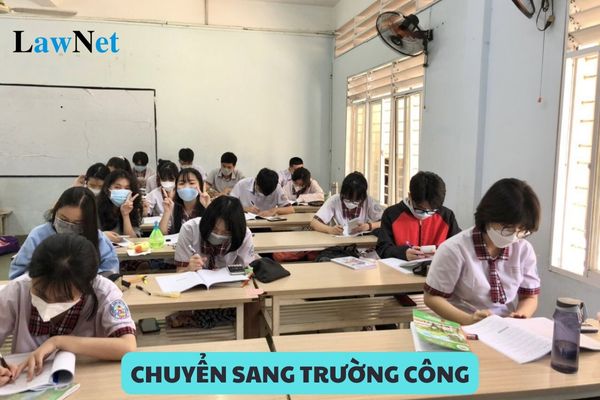

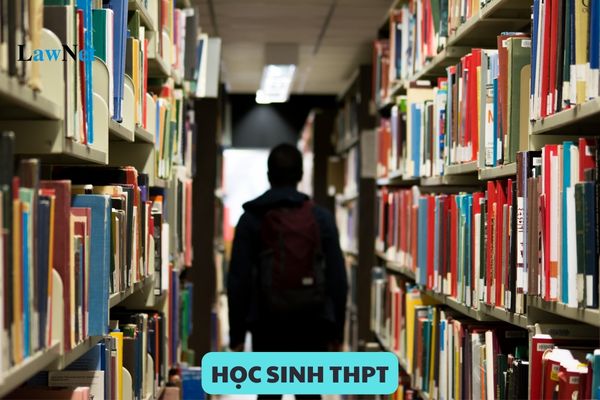


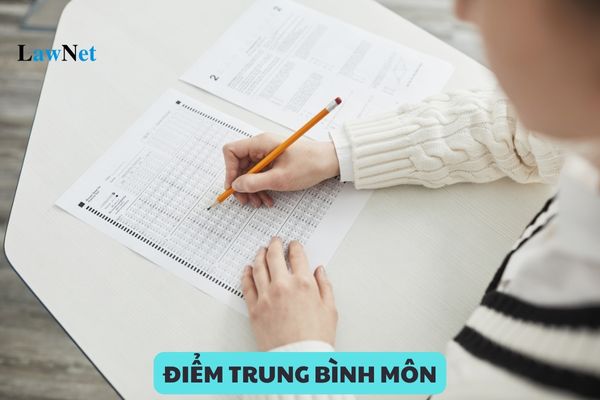
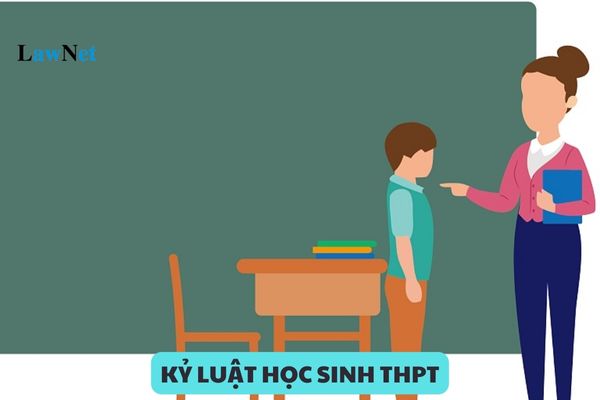
- After completing higher education in Vietnam, what english proficiency requirements must students meet?
- What are the specific objectives of higher education in Vietnam?
- Vietnam: What are the responsibilities of higher education institutions in scientific research activities of students?
- Vietnam: What are the cases in which the degree classification of post-secondary students will be lowered? What are the conditions for post-secondary graduation?
- Vietnam: Are lower secondary school students with Unqualified training results for the whole school year required to undergo training during summer break at school?
- Vietnam: What are the 10 core competencies of primary school students according to the 2018 General Education Program?
- Vietnam: Will primary school teachers acting as homeroom teachers be eligible for reduction of teaching lessons?
- Vietnam: What are the conditions for consideration for rank promotion to the professional titles of teachers?
- Vietnam: What is the course timelength in post-secondary and college programs?
- Vietnam: Do lower secondary school students have the right to dye their hair during a school year? Is dyeing hair during a school year prohibited act for lower secondary school students?

